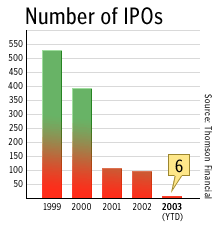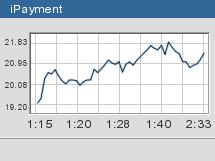NEW YORK (CNN/Money) -
The IPO market's longest dry spell in 28 years ended Monday when iPayment Inc., which processes credit card transactions, sold shares to the public.
iPayment shares rose $5, or 31 percent, to $21 Monday, for the best one-day performance for an IPO in nearly a year. But the strong showing could not overshadow an embarrassment for the investment bank that underwrote the first new offering since March 4.
Federal regulators say they determined that Bear Stearns, the underwriter, violated the spirit of a $1.4 billion settlement designed to reform business on Wall Street by separating research from investment banking.

By selling 5 million shares and raising $80 million, Nashville, Tenn.-based iPayment snapped a nine-week IPO drought that was the longest without a company going public since a 10-week stretch that ended Sept. 24, 1975, according to Thomson Financial.
iPayment, which has lost millions of dollars in its nine-year history, is only the sixth company to go public this year. That distinction could have been held by DigitalNet Holdings Inc., but underwriters pulled that deal last week because of unfavorable market conditions.
The iPayment IPO, expected to be priced last Thursday, was also delayed when the Wall Street Journal raised questions about a Bear Stearns analyst who participated in the IPO's road show. That practice would be in violation of last month's settlement between 10 banks and securities regulators that takes effect in late June.
"It's just astonishing to me that a firm could allow an analyst to participate in a road show -- and the fact that the prohibition on such conduct isn't literally in effect yet doesn't make me any less disappointed," said Stephen Cutler, the Securities and Exchange's Commission's director of enforcement.
Cutler said in a statement that Bear Stearns acknowledged the mistake and agreed to assign research coverage of the company to a different analyst.
"We deeply regret that this unfortunate incident occurred," Bear Stearns said in a statement, which pledged support for "both the letter and more importantly the spirit of the recent settlement agreement."
Finally, an IPO
Demand for IPOs has tumbled during the stock market's three-year fall, which erased $6.8 trillion in market value. The number of new offerings fell 26 percent in 2000, tumbled 72 percent in 2001, and another 12 percent last year, when 97 companies debuted, according to Thomson Financial.

This year probably will be worse, predicts Richard Peterson, a Thomson Financial analysts who nonetheless expects a pickup in the months ahead that could bring 2003's IPO total to around 50.
Fifty deals would not approach the IPO frenzy of 1999, when 529 companies went public, some doubling and tripling on their first day of trade. Those heady days have since become the focus of securities regulators looking into bull market abuses.
As for today's current market, the end of war with Iraq may unleash a backlog in deals postponed by the conflict, Peterson said. Stocks, meanwhile, are higher this year, in a development that could encourage companies toying with public offerings.
Since its low on Oct. 9, 2002, the Wilshire 5000 -- a broad stock market index -- has gained 20.5 percent, but still is down 40 percent since peaking on March 24, 2000.
The dark 70s
The last time the IPO market was this slow was in 1975, the year after the stock market had endured two years off steep losses. Rising inflation and the resignation of Richard Nixon, who gave up the presidency in 1974, helped sap investor confidence.
Today's investors, burned by accounting scandals and discouraged by an economy in which employers cut more than 2 million jobs in two years, are also avoiding new stocks.
"IPOs still face multifaceted problems," said David Menlow, president of IPO Financial Network, a Millburn, N.J., based firm that tracks new offerings.
One problem iPayment (IPMT: Research, Estimates) may face is debt. The company said it will use money from its IPO to pay off some of the $78 million it owes.
The company said in a filing with regulators that it lost $493,000 last year following a $4.9 million loss in 2001. But things may be turning around for iPayment, which provides credit card authorization and fraud detection services for small and medium-sized businesses, many of which take money over the phone or Internet. iPayment had net income of $900,000 in the first quarter of this year.
Trading on Nasdaq using the ticker symbol "IMPT", iPayment enjoyed stronger-than-expected demand. The company originally planned to sell 4.5 million shares between $14 and $16 apiece.
Monday's 31 percent gain was the best advancefor an IPO since June, 28, 2002, when Montana Mill Bread (MMX: Research, Estimates) rose 34 percent in its debut, Thomson Financial said.
Before Monday, no company had gone public since March 4, when Telkom SA Ltd. (TKG: Research, Estimates), a South African telecommunications company, sold shares.

|

